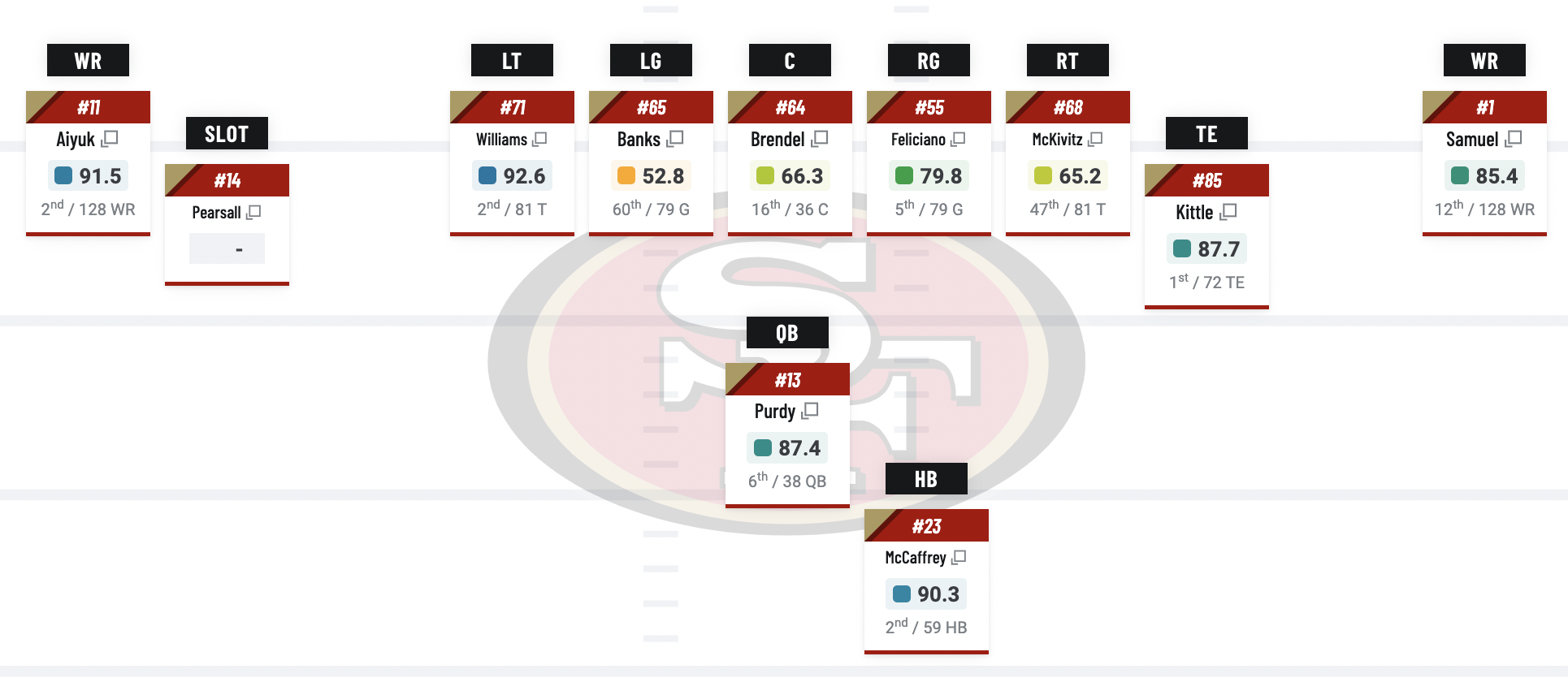• Aiyuk's lack of eye-popping surface-level numbers has many questioning his talent: The absence of volume isn't indicative of his abilities, though. In the past 10 years, only six receivers have hit 3.0 yards per route run over a season, Aiyuk being one of them.
• George Kittle is a relevant case study: Widely considered among the game's elite tight ends, Kittle has seen 10-plus targets 13 times in his career. In those games, he has averaged 114 yards, clearing 150 four times (with two more at 149). But in 2023, he averaged just 5.5 targets per game.
• Get a head start on fantasy football: Use PFF's fantasy football mock draft simulator to create real live mock draft simulations to get ready for your live draft!
Estimated Reading Time: 5 minutes
The San Francisco 49ers’ contract standoff with wide receiver Brandon Aiyuk has led to repeated trade rumors and a general discourse around just how good he is.
ESPN's Adam Schefter reported that the 49ers themselves have been inconsistent with their evaluation, characterizing Aiyuk as a high-end No. 2 receiver when it comes to negotiating his contract but an elite No. 1 when it comes to setting a price for trade suitors.
That about sums up the variety of opinions on Aiyuk in the general football sphere. But make no mistake: This is an elite receiver.
It’s easy to construct a case for Aiyuk not being among the game’s best. Receiver has always been a position driven by statistics, and in an era of ever-increasing passing numbers, Aiyuk doesn’t put up mind-blowing stats.
Last season, he ranked seventh in receiving yardage, 31st in receptions and tied for 18th in touchdowns. That is still the holy trinity of receiver numbers, but they are obviously only surface-level statistics and do nothing to add context.
Thirty-six players saw more targets than Aiyuk last season. Opportunity drives production, and while receivers influence their own opportunities, it isn’t the only factor. Aiyuk does well to get open, but the 49ers' offense has a lot of mouths to feed.
San Francisco has unquestionably the best collection of skill-position talent in the NFL. In addition to Aiyuk, George Kittle, Deebo Samuel and Christian McCaffrey are each either a unique playmaker or arguably the best in the league at their respective position.

Kittle, in particular, makes a good case study for Aiyuk. We have seen games where the 49ers were depleted on offense and the gameplan has run through Kittle as the primary playmaker. Almost every time it does, he dominates.
In his career, Kittle has seen 10 targets or more 13 times. In those games, he has averaged 114 yards, clearing 150 four times (with two more at 149). But the 49ers have so many playmakers that, typically, Kittle’s role is far smaller. Last season, he averaged just 5.5 targets per game.
There are fewer elite tight ends in the league, and the consistent evidence of what happens when the offense runs through Kittle says he is an elite player at that position, but Aiyuk hasn’t earned that benefit of the doubt yet among many. Still, the signs are there that he is in the same category.
If we dive just a little deeper than those surface-level stats from earlier, we see that Aiyuk is clearly one of the most efficient receivers in the game, doing the most with the opportunities he does get. Tyreek Hill led the league in yards per route run during the 2023 regular season (3.82), and Aiyuk ranked third (3.01). In the past 10 years, only four other receivers have hit 3.0 yards per route run over a season.

Targets to Aiyuk last season generated a 124.0 passer rating, and that figure is 112.8 for his career.
PFF grades also match up with those efficiency numbers. PFF grades are a play-by-play analysis of a player’s performance, independent of the results of the play and many of the confounding factors within statistics. Only Tyreek Hill recorded a higher PFF grade than Aiyuk last season, and like all 49ers receivers, he was outstanding as a run blocker, earning a top-10 grade in that area.
Aiyuk also has exceptional hands. He dropped only two passes in 2023 and has never dropped more than six in a season.
The strongest argument against Aiyuk being a truly elite receiver in today’s NFL is simply the sample size. He was exceptional last season by any measure beyond simple volume stats, a step forward from his previous career baseline of “very good, but not elite.” If that represents the expected growth and development curve from a young receiver, and we can expect that level of play to continue, then he is one of the best in the game and should be paid accordingly. But it’s also possible that it was the high water mark of his capabilities, and his true baseline will settle somewhere in between what he had shown in the past and last season.
In that case, there is a stronger argument that he isn’t the same level of difference-maker as the game's top receivers, especially when you factor in that the 49ers' offense will afford him fewer opportunities than those players.
The reality of the situation may well be what Schefter has relayed from the 49ers: Aiyuk is worth more to another team where he would get a bigger role than he is to San Francisco. The front office would love to keep him on the roster and maintain the best weaponry in the game, but it doesn’t make sense for them to pay him on the level of Justin Jefferson or Tyreek Hill because their offense limits his impact.
The bottom line is that Aiyuk is an elite receiver, but if you judge such things by volume stats, we may never see that evidence in San Francisco.




 © 2024 PFF - all rights reserved.
© 2024 PFF - all rights reserved.